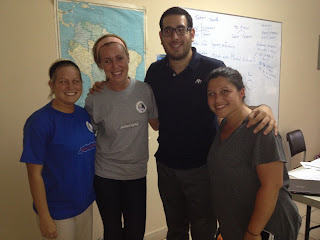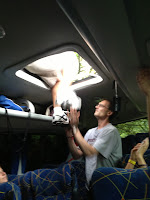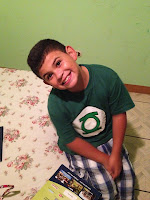I am beginning to
write this blog on my last night here in Monteverde. Earlier this evening I
enjoyed a wonderful dinner with my family where I shared my favorite experiences
of my visit to Costa Rica with them and copied recipes from my Mama Tica on
typical Costa Rican (comida tipica) dishes.
After helping with the dishes and doing some packing, my host family and
I watched the Costa Rica v. Honduras soccer futbol game. During the game we joked, laughed, and of
course got very involved in the game!
CPI in San Jaquain
It’s hard to believe that just two weeks ago I had just met
this family and have been in Costa Rica for over a month. My attitude and confidence in my Spanish usage
has completely changed as well as my ability to adapt and immerse myself into a
completely unknown culture. I plan on
writing this final reflection over a period of about a week after my trip to
Costa Rica so that I am fully able to process and reflect on my trip and write
as insightfully as I can.
3rd weekend in La Fortuna
Friday, June 14th---
Well, it’s been almost a week since I have been back in the
States and still feel as though I haven’t fully processed my time in Costa
Rica! Around this time seven days ago my
final Spanish class was wrapping up with over 65 hours of Spanish instruction
completed. Wow! I feel accomplished for
the amount of Spanish I learned as well my daily application of my new
vocabulary.
Small group work in Cloud Forest School
Evidence of sustainability within school curriculum!
Because I’m not really sure how to begin reflecting on my
experience as a whole (and because former blog posts touched on outstanding
thoughts I had during the trip) I will give several bullet points on the most
important things I took away from this immersion trip in regards to my future
as an educator:
·
Importance
of hospitality
o
As described in a blog post, one of the reasons
my experience was so great was because of the hospitality my host family
demonstrated
o
As a future teacher, I need to make sure my
students are comfortable in my classroom before learning can occur
·
Learning
through experience
o
New understanding and appreciation for “Demonstration,
Not Translation” method of teaching ELLs
o
I learned how to expand the 5E lesson format
beyond just the subject of science
·
Allowing
yourself out of your comfort zone
o
Life really does begin at the end of your
comfort zone!
o
I was out of my comfort zone nearly my entire
time in Costa Rica
o
I believe you get the most meaningful learning
when you experience new things and temporary discomfort
·
Importance
of health
o
Visit to La Carpio really demonstrated the
importance of health
o
These people feel unhealthy every day
o
Their health effects their mindset, their job,
and their education
·
Uncertainty
is OKAY
o
As humans, we don’t always need answers
o
Let go of constant control—learn the Tico
lifestyle
·
Taking
away differences from the same, similar experience
o
Each of us students took away different thoughts
and lessons from the places we visited
·
Learning
is HARD!
o
Celebrate the struggles your students will have
in their learing
o
Learning isn’t always fun
o
Meaningful learning comes from the times you
struggled to understand, apply, and master a concept
Zip lining in Santa Elena!
Before my trip to Costa Rica, I hadn’t really given much
thought to how I will interact and teach my future ELL students. My reasoning
has gone beyond “fun” learning and learning that only occurs with a similar language. Now, I realize that learning is a process
that occurs through a series of steps and varied efforts. Although I will most likely not be proficient
in my ELL’s native language, I will do my best to communicate with them in any way
to engage them and inspire their learning.
PURA VIDA!






































